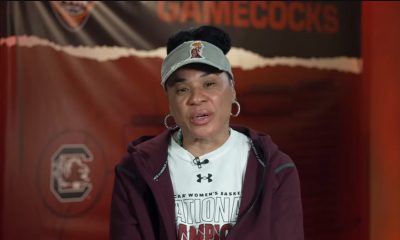National
Lessons from N.C. defeat
Did lack of money or wrong message lead to sweeping anti-gay marriage amendment?
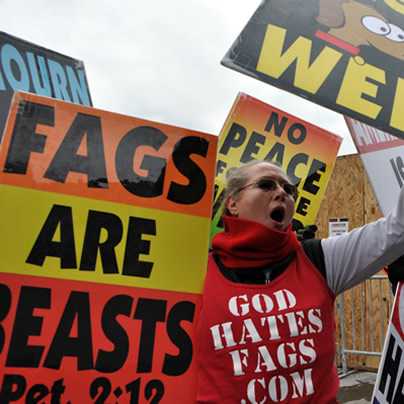
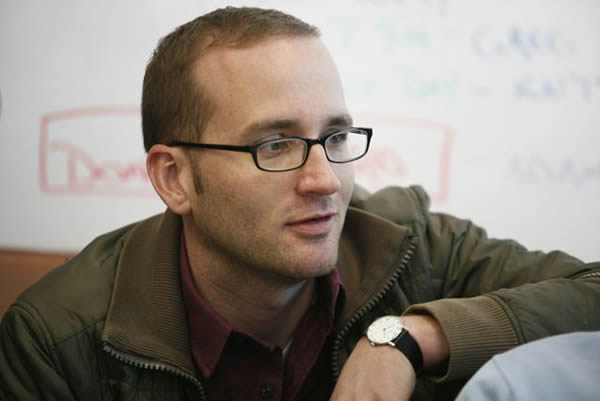
Incoming HRC President Chad Griffin is one of two principal partners in Armour Griffin Media Group, which was paid to produce TV ads in North Carolina’s amendment fight. (Photo courtesy of AFER)
In the week leading up to the May 8 vote in North Carolina on a proposed state constitutional amendment banning same-sex marriage and civil unions, officials with the campaign opposing the amendment said they believed they had a shot at defeating it.
“We were on conference calls where they were saying we are in striking distance,” said lesbian journalist and commentator Pam Spaulding of North Carolina, who publishes the LGBT political blog Pam’s House Blend.
“The campaign was saying 11 points and closing — that we were knocking in half the gap every week that they started the final [campaign] assault,” Spaulding told the Blade.
According to Spaulding, at an election night gathering in Raleigh, campaign leaders and volunteers who worked to defeat the amendment were stunned when the State Board of Elections announced the amendment passed by a 61-39 percent margin.
“Were their numbers that far off or did they know the numbers and were not disclosing them,” Spaulding asked in discussing the information released by the opposition campaign to bloggers. “How could they be 21 points off?”
Officials with the Coalition to Protect All North Carolina Families, which operated the campaign opposing Amendment One, said the numbers they cited were from the polling firm Public Policy Polling, which showed support for the amendment down to 55 percent in the week before the election.
“There were a lot of polls, and they were all across the map,” said Stuart Campbell, executive director of the statewide LGBT advocacy group Equality North Carolina and a member of the opposition campaign’s seven-member Steering Committee.
“We actually had internal polling back in January that showed close to 70 percent — around 67 to 68 percent — in favor,” he said. “So we actually do believe we moved it anywhere between seven and 10 points.”
In addition to Equality North Carolina, the organizations represented on the Steering Committee, whom officials said made all key decisions for the campaign, included the Human Rights Campaign; the ACLU of North Carolina; Faith In America; Replacements, Ltd., a gay-owned company that sells upscale dinnerware; Self-Help, an LGBT supportive credit union based in North Carolina; and Southerners on New Ground (SONG), a North Carolina group that promotes progressive causes.
In late December or early January the Steering Committee retained the Los Angeles-based Armour Griffin Media Group to produce the campaign TV ads. Officials said the campaign retained the company months before they learned that Chad Griffin, one of the two principal partners in the firm, was to be selected as the new HRC president. Campaign finance records show the campaign paid the company $66,000 for its media work as of May 11, the close of the most recent campaign finance reporting period.
Campbell and campaign co-chair Alex Miller said the campaign built important alliances with progressive groups, LGBT supportive churches and religious leaders, and leaders of the African-American community that would benefit the LGBT community for years to come.
One of the most important developments, Campbell and Miller said, was the decision by the NAACP of North Carolina to come out against the amendment. Under the leadership of Rev. William Barber II, the state’s NAACP president, the historic black civil rights organization activated its chapters in counties across the state to speak out against the amendment.
Barber told the Blade that he believes a majority of black North Carolinians voted against the amendment despite claims by some media outlets that polls showed a majority of blacks favored the ballot measure.
Ray Warren, a former North Carolina circuit court judge who’s familiar with the state’s voting trends and demographics, said a review of the vote in most parts of the state showed that all of the state’s large cities and urban areas voted against the amendment. In what he called a dramatic contrast, all of the rural counties and nearly all of the suburbs outside city boundaries voted for the amendment.
Ninety-two of the state’s 100 counties voted for the amendment. Each of the eight counties voting against it included cities or urban-oriented towns with universities within their boundaries.
According to Warren, in a development rarely seen in the state, black and white voters appeared to vote alike, with majority white and majority black precincts voting for the amendment in rural and suburban areas. In cities and urban centers, majority black and majority white precincts voted against the amendment, Warren said.
Debate over campaign message
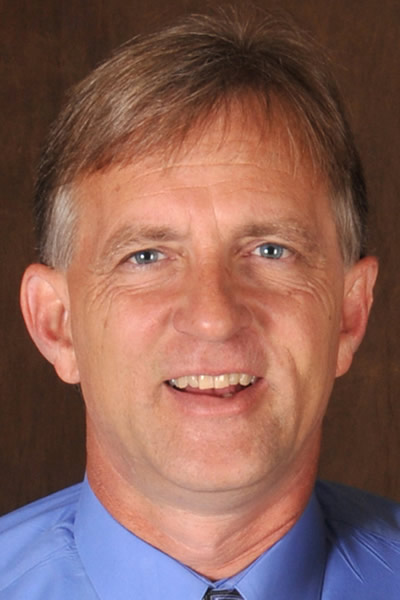
Brent Childers, executive director of Faith in America, said the campaign could have been more effective in challenging and refuting religious arguments used to support Amendment One. (Photo courtesy of Childers)
Some LGBT supportive observers wanted to know whether the message projected by the campaign opposing the amendment in TV ads and other media amounted to the best means possible to persuade voters to reject the amendment.
Marriage equality supporter Brent Childers, executive director of the North Carolina-based group Faith in America, which challenges what Childers calls the “misuse” of religion to deny rights to LGBT people, said the campaign could have been more effective in challenging and refuting religious arguments used to support Amendment One.
Still others, including North Carolina lesbian activist Mandy Carter, joined Spaulding in expressing concern that the opposition campaign mostly “de-gayed” its messages in TV ads by stressing the harms the amendment would have on straight unmarried couples.
Campaign officials dispute these claims, saying the campaign aggressively embraced its support for marriage equality for gays and projected that message through many campaign venues, including online videos as well as TV ads.
The campaign recruited a lesbian mother to appear in one of the three TV ads aired shortly before the election. Campaign officials told the media in a press release that the woman and her same-sex partner rely on the partner’s employee health insurance to provide coverage for their daughter.
But in the TV ad the woman isn’t identified as a lesbian. While driving a car with her child sitting next to her she says Amendment One would likely result in the loss of her daughter’s health insurance.
“[It’s] because we’re not married,” she says in the ad, referring to her partner. The partner’s gender isn’t mentioned.
“If you’re watching it on television there’s no way to know,” Spaulding said, referring to the woman’s sexual orientation.
Campaign officials said they believe the ad was effective in showing how the amendment would have serious consequences for unmarried couples, gay or straight, and it likely persuaded some voters to oppose the amendment.
In a series of interviews, pollsters, campaign officials, political analysts affiliated with North Carolina universities, representatives of LGBT advocacy groups, and LGBT supportive straight allies provided the Blade with a wide range of opinions addressing these questions.
Most agreed, however, that private polls commissioned for the campaign as well as polls conducted by other pollsters showed that a solid majority of North Carolinians oppose same-sex marriage on religious grounds. They noted that the same polls showed that a campaign and vote framed only around the question of whether gays should be allowed to marry would result in a certain defeat for the pro-marriage equality side.
Leaders of the Coalition to Protect All North Carolina Families said they chose an “evidence-based” approach of using the best possible research from privately commissioned polls to develop the message they ultimately used.
That message focused on how Amendment One goes far beyond banning same-sex marriage and, among other things, would ban civil unions for gay and straight couples. It could also lead to a wide range of harmful effects on all unmarried couples, gay and straight, and their children, the group stressed in its “messaging” campaign.
Advocates of this approach noted that an existing law in North Carolina already prohibited same-sex marriage and that an amendment to the state constitution doing the same thing was unnecessary.
Supporters of the amendment disputed that assertion, saying a constitutional amendment was needed to prevent a court from overturning the state’s existing law banning same-sex marriage. They noted that gay rights advocates had already filed at least one lawsuit challenging the existing gay marriage statute.
Political observers noted that after blocking a constitutional ban on same-sex marriage for years under Democratic Party leadership, the state legislature approved a proposal to place the issue before the voters in 2011 after Republicans gained control of the legislature for the first time in decades in the 2010 election.
Over the strong objections of many Democrats and some Republicans, supporters of the amendment worded it in a way that expanded its scope beyond just marriage.
Amendment One states, “Marriage between one man and one woman is the only domestic legal union that shall be valid or recognized in this State.”
The amendment adds, “This section does not prohibit a private party from entering into contracts with another private party; nor does this section prohibit courts from adjudicating the rights of private parties pursuant to such contracts.”
Legal experts in the state have said the amendment’s definition of marriage as the “only domestic legal union” would place in jeopardy rights and benefits currently being offered to gay or straight unmarried couples, such as domestic partner benefits offered by private companies or local governmental entities like cities and towns, including health insurance benefits and hospital visitation rights.
The Coalition to Protect All North Carolina Families cited legal experts who said safeguards against domestic violence might also be jeopardized by the amendment, with the possibility that a court could no longer issue a legal “stay away” order for a partner accused of physically abusing the other partner if the couple were not married.
“We saw that all these terrible things could happen,” said Stuart Campbell, executive director of the state LGBT advocacy group Equality North Carolina and a member of the Steering Committee of the campaign opposing the amendment.
Supporters of the amendment, led by the state group Vote for North Carolina Marriage and the anti-gay National Organization for Marriage, said claims that the amendment would impact health insurance benefits, domestic violence protections or child custody rights were unfounded.
Campbell said the Coalition to Protect All North Carolina Families’ Steering Committee initially hired the LGBT supportive polling firm Greenberg Quinlan Rosner Research headed by pollster Anna Greenberg. In an effort to get a second opinion, the Steering committee a short time later retained Lake Research Partners, another LGBT supportive campaign research firm headed by pollster Celinda Lake. Both firms have long-established records of helping to win elections for mostly Democratic candidates and progressive causes.
Lake was the pollster in the 2006 campaign opposing a proposed same-sex marriage ban in Arizona that was defeated by voters, the only such ballot measure to lose in more than 30 states across the country that voted on such a measure. Observers said the measure lost in Arizona because most voters disagreed with the additional restrictions it would place on unmarried couples, similar to the “harms” cited by opponents of Amendment One in North Carolina.
Two years later, Arizona voters approved a same-sex marriage ban that didn’t include the additional restrictions on unmarried couples.
Lake told the Blade that the North Carolina campaign stressed the harms Amendment One would cause to gay and straight unmarried couples, including the children of such couples, but it was not modeled directly after the Arizona campaign since the two states have different voter demographics and political traditions.
Lake said her early polling in North Carolina conducted to test different messages clearly found that a message of the potential harm Amendment One would cause for unmarried couples, gay and straight, children of these couples, and women threatened by domestic violence resonated with many voters. Among other things, a significant number of voters who planned to vote for Amendment One changed their position and stated in her poll that they would vote against it after learning about the amendment’s impact beyond banning same-sex marriage, Lake said.
Lake described as historic the North Carolina campaign’s use of a TV ad asserting that Amendment One would harm children, saying it represented the first time a campaign opposing a ballot measure seeking to ban same-sex marriage has argued that such a proposal would harm children.
She noted that in all previous campaigns, supporters of anti-gay ballot measures argued that same-sex marriage would be harmful to children. In North Carolina, the campaign against the amendment turned the tables on the anti-marriage equality forces, opening the way for this “game-changing” strategy in future battles against ballot measures seeking to ban same-sex marriage, Lake said.
When asked why Amendment One passed by a 61 percent to 39 percent margin despite the use of the “unintended consequences” and harm to children strategy, Lake and others working with her on the campaign cited the campaign’s lack of sufficient funds to pay for more TV ads and their inability to begin airing the ads sooner.
Jeremy Kennedy, the campaign manager hired by the coalition Steering Committee to carry out the committee’s game plan, said more than 60 percent of the $2.8 million raised by the campaign came in during the last few weeks leading up to the May 8 election.
The three TV ads the campaign used didn’t begin airing until the state’s early voting had already started about 15 days prior to Election Day.
“I was surprised that the opposition campaign didn’t get on the air sooner,” said Wake Forest University political science professor John Dinan, who said he followed the campaigns for and against the amendment.
“To move voters you need to put on TV ads much sooner,” he said.
Kennedy said that in the last few weeks of the campaign, donors began to respond when some outside polls, including those conducted by the firm Public Policy Polling, showed the projected vote for the amendment dropping to about 55 percent.
“If we all had our way and we had early money we would have done several months of TV,” Kennedy said.
Kennedy, 34, is a native of Texas who moved to D.C. in 2007 to work on the presidential campaign of Hillary Clinton. After Clinton dropped out of the presidential race following the primary season in 2008, Kennedy took a job with the Human Rights Campaign’s field department in Washington.
In 2010 he moved to Maine to work on the gubernatorial primary campaign of Democrat Elizabeth “Libby” Mitchell, who won the primary but lost the general election to Republican Gov. Paul Lepage. Following that campaign, Kennedy went to work as a state field director for the Maine Democratic Party.
He next went to Rhode Island to work on the legislative effort in the state to pass a same-sex marriage law. The legislature changed course and approved a civil unions bill rather than a marriage law. Shortly after returning to Maine, which he considers his home state, Kennedy was recruited to North Carolina last December, where the Coalition to Protect All North Carolina Families hired him as campaign manager to work for the defeat of Amendment One.
One source familiar with the campaign said the Steering Committee awarded Kennedy a $5,000 bonus near the end of the campaign. Another source expressed concern that money for the bonus would have been better used to pay for additional media ads.
Campbell declined to confirm the amount of the bonus, saying it was a personnel matter that would not be appropriate to discuss publicly. However, he added, “It was not such a large amount that it would make a difference in the media campaign.
“I have nothing but good things to say about Jeremy,” Campbell said. “I think he did an excellent job. He ran the campaign that we hired him to run.”
HRC spokesperson Fred Sainz agreed with Campbell’s assessment of Kennedy.
“In everyone’s estimation – including ours – Jeremy Kennedy is a superstar!” Sainz said in an email to the Blade. “This campaign brought together a diverse coalition that left behind an infrastructure in North Carolina upon which we can build upon for progressive politics and gay rights.”
Sainz said that while the loss was a big disappointment, ballot measures banning same-sex marriage passed in the other Southern states by an average of 75 percent in past years. He said the 61 percent to 39 percent margin of approval of a gay marriage ban in North Carolina shows “amazing progress among Southerners and Americans in general on the issue of marriage equality.”
Approval by voters in Virginia of a state constitutional ban on gay marriage in 2006 by a margin of 57 percent marked the only Southern state with support for such an amendment at a lower percentage than North Carolina. Florida passed such an amendment with a margin of 62 percent in 2008. South Carolina approved a marriage ban amendment by a 78 percent margin of approval in 2006.
Campbell and campaign co-chair Miller said reports by some critics that the campaign ended with a significant surplus and that the campaign chose not to distribute yard signs to urge voters to defeat the amendment were not true.
The campaign distributed as many as 15,000 yard signs opposing Amendment One in mostly urban areas throughout the state, campaign officials said.
Miller said that the campaign’s finance report filed on May 21 showing a $92,317 surplus was based on incomplete data. Bills for media-related expenses and other expenditures had yet to be paid at the time of the report’s filing deadline. He said final expenses would be shown in a final, end-of-the-year report to be filed with the election board.
“We were pretty much down to the last penny,” he said of the campaign’s spending.
‘Mood is grim’
A 17-page memo that Greenberg sent to the campaign Steering Committee on Dec. 6, 2011, a copy of which the Blade obtained, says her polling found that a significant number of voters were inclined to change their vote from “yes” to “no” on the amendment after they learned of the potential harmful impact it would have, including its prohibition against civil unions and overall harmful effects on children.
Greenberg noted in her memo that many voters who opposed same-sex marriage did not object to civil unions for gay or straight couples.
But unlike Lake, Greenberg stated the overall prospects for defeating Amendment One were not encouraging even when the “unintended effects” were spelled out to prospective voters.
“The mood is grim — and conservative — in North Carolina,” she said in the memo. “North Carolina shocked the country by delivering its electoral votes to Barack Obama in 2008. The world has since turned,” she wrote in the memo. “Half of this (special) electorate describes their feelings toward Obama in negative terms,” she added in discussing her poll findings.
A source familiar with the campaign, who spoke on condition of not being identified, said Greenberg made it clear she didn’t think a victory was possible for the opposition side. Instead, she recommended the campaign adopt a strategy that would educate voters and help their opinions in favor of marriage equality for a future campaign, the source said.
“We would not complicate this issue with a discussion of the impact this would have on straight, unmarried couples, despite the Arizona experience,” she wrote in her memo. “Voters’ moral judgment is not expended entirely on the LGBTQ community as voters here have problems with unmarried straight couples living together as well. An additional focus on straight couples does not make enough difference to justify muddying up your message,” she said in the memo.
She said her memo was based on a survey of 600 likely special election voters in North Carolina taken Nov. 16-21, 2011. She said her poll, which had a margin of error of plus or minus 4 percent, found that 66 percent of the voters surveyed supported Amendment One, with 30 percent opposing it.
“More information and messaging reduced down the margin so by the end of the survey the support side leads by 24 points (59 percent favor, 36 percent oppose),” she said of the poll.
Greenberg’s adjusted poll numbers, reflecting the “messaging” that opponents used in the campaign, came close to the 61 percent to 39 percent outcome of the election nearly six months later.
Similar to Lake, Greenberg noted in her memo that opponents of Amendment One would need to invest in an extensive media campaign to educate voters of the harms the amendment would likely cause LGBT people and others.
Kennedy told the Blade that despite the fact that the campaign came close to meeting its $3 million fundraising goal, far more money was needed to educate voters that polls showed would switch from support to opposition of the amendment if they knew it went beyond just banning same-sex marriage.
Rev. Barber of the NAACP said the media were partially responsible for the lack of voter education.
“The folks who brought this forward framed it on whether you support gay marriage on religious grounds,” he said. “And the media fell for this. They should have made it clear that this was a constitutional amendment that would take away rights.”
He added, “The NAACP saw a dangerous pattern. We saw the rights of a minority being put up for a popular vote. The media never asked the right questions.”
Childers of Faith In America said he attempted but did not succeed in persuading the campaign to directly respond to attacks against same-sex marriage by religious groups and leaders. He said Faith In America, which was co-founded by gay businessman Mitchell Gold, believes the opposition vote would have been considerably higher if the campaign addressed the religion issue “head on” in TV and other media ads.
Childers noted that the campaign opposing the amendment, among other things, should have responded to religious leaders’ claims that same-sex marriage is against God’s will. The Rev. Billy Graham was among the religious leaders in the state to come out for the amendment.
When told that sources familiar with the campaign said campaign officials were reluctant to question or challenge voters’ religious beliefs, Childers said, “That’s one of the fallacies that frankly our own community have fallen prey to. Any person that has spent much time at all in a religious environment knows that religious teachings are questioned all the time,” he said.
“If you look at the voice of history it is crystal clear when it comes to misuse of religious teachings to justify prejudice and discrimination against minorities,” Childers said. “We have concluded as a society on a number of occasions that that is simply a moral failing as a society.”
U.S. Supreme Court
US Supreme Court rules Idaho to enforce gender care ban
House Bill 71 signed in 2023


BY MIA MALDONADO | The U.S. Supreme Court has allowed Idaho to enforce House Bill 71, a law banning Idaho youth from receiving gender-affirming care medications and surgeries.
In an opinion issued Monday, the U.S. Supreme Court granted the state of Idaho’s request to stay the preliminary injunction, which blocked the law from taking effect. This means the preliminary injunction now only applies to the plaintiffs involved in Poe v. Labrador — a lawsuit brought on by the families of two transgender teens in Idaho who seek gender-affirming care.
Monday’s Supreme Court decision enforces the gender-affirming care ban for all other trans youth in Idaho as the lawsuit remains ongoing in the Ninth Circuit Court of Appeals.

The American Civil Liberties Union and the ACLU of Idaho, both of whom represent the plaintiffs, said in a press release Monday that the ruling “does not touch upon the constitutionality” of HB 71. The groups called Monday’s ruling an “awful result” for trans Idaho youth and their families.
“Today’s ruling allows the state to shut down the care that thousands of families rely on while sowing further confusion and disruption,” the organizations said in the press release. “Nonetheless, today’s result only leaves us all the more determined to defeat this law in the courts entirely, making Idaho a safer state to raise every family.”
Idaho Attorney General Raúl Labrador in a press release said the state has a duty to protect and support all children, and that he is proud of the state’s legal stance.
“Those suffering from gender dysphoria deserve love, support and medical care rooted in biological reality,” Labrador said. “Denying the basic truth that boys and girls are biologically different hurts our kids. No one has the right to harm children, and I’m grateful that we, as the state, have the power — and duty — to protect them.”
Recap of Idaho’s HB 71, and what led to SCOTUS opinion
Monday’s Supreme Court decision traces back to when HB 71 was signed into law in April 2023.
The law makes it a felony punishable for up to 10 years for doctors to provide surgeries, puberty-blockers and hormones to trans people under the age of 18. However, gender-affirming surgeries are not and were not performed among Idaho adults or youth before the bill was signed into law, the Idaho Capital Sun previously reported.
One month after it was signed into law, the families of two trans teens sued the state in a lawsuit alleging the bill violates the 14th Amendment’s guarantee of equal protection under the law.
In late December, just days before the law was set to take effect in the new year, U.S. District Judge B. Lynn Winmill blocked the law from taking effect under a preliminary injunction. In his decision, he said he found the families likely to succeed in their challenge.
The state of Idaho responded by appealing the district court’s preliminary injunction decision to the Ninth Circuit, to which the Ninth Circuit denied. The state of Idaho argued the court should at least enforce the ban for everyone except for the plaintiffs.
After the Ninth Circuit’s denial, the Idaho Attorney General’s Office in February sent an emergency motion to the U.S. Supreme Court, the Idaho Press reported. Monday’s U.S. Supreme Court decision agrees with the state’s request to enforce its ban on trans health care for minors, except for the two plaintiffs.
******************************************************************************************

Mia Maldonado joined the Idaho Capital Sun after working as a breaking news reporter at the Idaho Statesman covering stories related to crime, education, growth and politics. She previously interned at the Idaho Capital Sun through the Voces Internship of Idaho, an equity-driven program for young Latinos to work in Idaho news. Born and raised in Coeur d’Alene, Mia moved to the Treasure Valley for college where she graduated from the College of Idaho with a bachelor’s degree in Spanish and international political economy.
******************************************************************************************
The preceding piece was previously published by the Idaho Capital Sun and is republished with permission.
The Idaho Capital Sun is the Gem State’s newest nonprofit news organization delivering accountability journalism on state politics, health care, tax policy, the environment and more.
We’re part of States Newsroom, the nation’s largest state-focused nonprofit news organization.
Kansas
Kansas governor vetoes ban on health care for transgender youth
Republican lawmakers have vowed to override veto
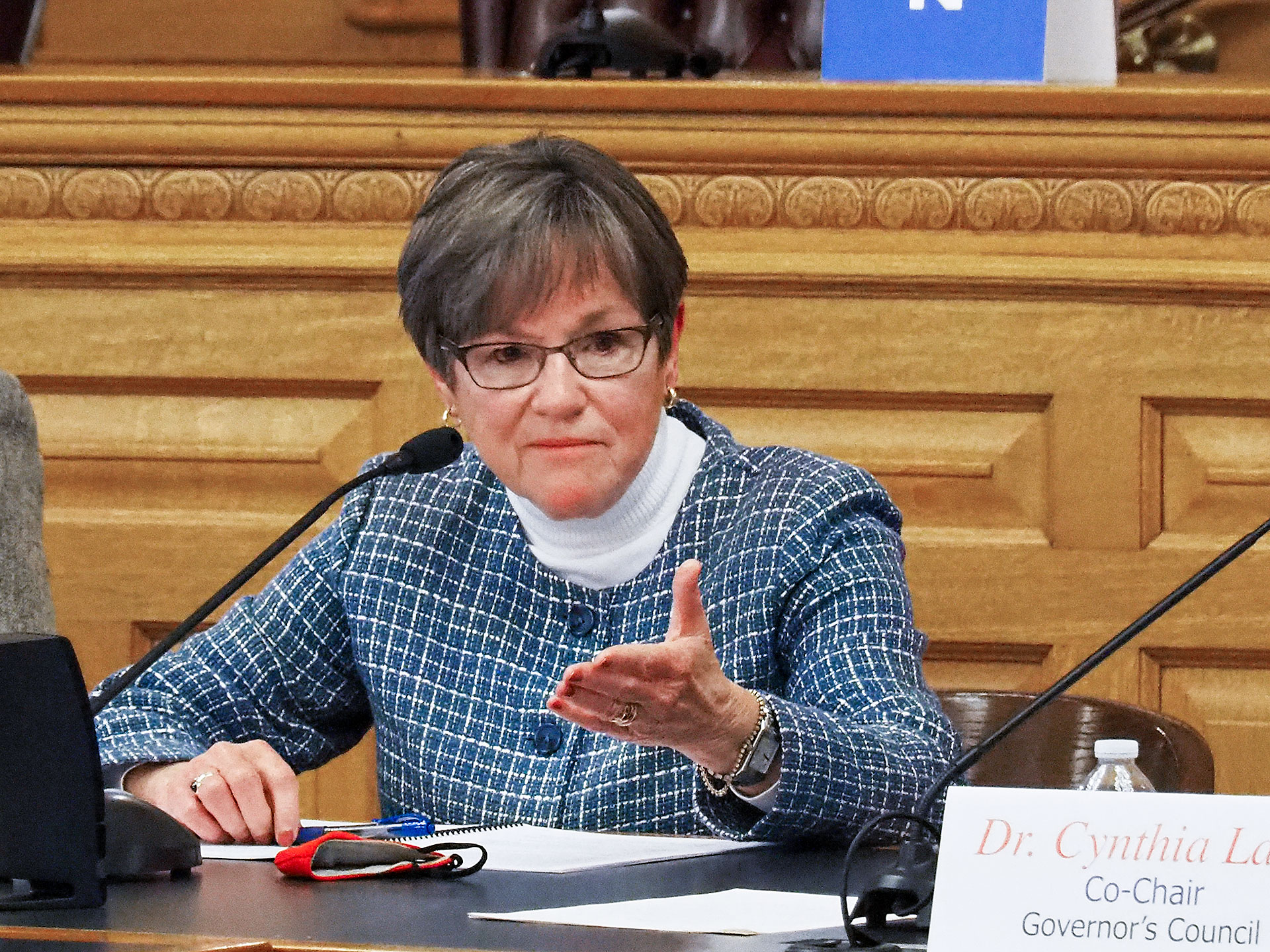

BY TIM CARPENTER | Gov. Laura Kelly flexed a veto pen to reject bills Friday prohibiting gender identity health care for transgender youth, introducing a vague crime of coercing someone to have an abortion and implementing a broader survey of women seeking abortion that was certain to trigger veto override attempts in the Republican-led House and Senate.
The decisions by the Democratic governor to use her authority to reject these health and abortion rights bills didn’t come as a surprise given her previous opposition to lawmakers intervening in personal decisions that she believed ought to remain the domain of families and physicians.
Kelly said Senate Bill 233, which would ban gender-affirming care for trans minors in Kansas, was an unwarranted attack on a small number of Kansans under 18. She said the bill was based on a politically distorted belief the Legislature knew better than parents how to raise their children.
She said it was neither a conservative nor Kansas value to block medical professionals from performing surgery or prescribing puberty blockers for their patients. She said stripping doctors of their licenses for serving health interests of patients was wrong. Under the bill, offending physicians could be face lawsuits and their professional liability insurance couldn’t be relied on to defend themselves in court.
“To be clear, this legislation tramples parental rights,” Kelly said. “The last place that I would want to be as a politician is between a parent and a child who needed medical care of any kind. And, yet, that is exactly what this legislation does.”
Senate President Ty Masterson (R-Andover) and House Speaker Dan Hawkins (R-Wichita) responded to the governor by denouncing the vetoes and pledging to seek overrides when legislators returned to the Capitol on April 26. The trans bill was passed 27-13 in the Senate and 82-39 in the House, suggesting both chambers were in striking distance of a two-thirds majority necessary to thwart the governor.
“The governor has made it clear yet again that the radical left controls her veto pen,” Masterson said. “This devotion to extremism will not stand, and we look forward to overriding her vetoes when we return in two weeks.”
Cathryn Oakley, senior director of the Human Rights Campaign, said the ban on crucial, medically necessary health care for trans youth was discriminatory, designed to spread dangerous misinformation and timed to rile up anti-LGBTQ activists.
“Every credible medical organization — representing over 1.3 million doctors in the United States — calls for age-appropriate, gender-affirming care for transgender and nonbinary people,” Oakley said. “This is why majorities of Americans oppose criminalizing or banning gender-affirming care.”
Abortion coercion
Kelly also vetoed House Bill 2436 that would create the felony crime of engaging in physical, financial or documentary coercion to compel a girl or woman to end a pregnancy despite an expressed desire to carry the fetus to term. It was approved 27-11 in the Senate and 82-37 in the House, again potentially on the cusp of achieving a veto override.
The legislation would establish sentences of one year in jail and $5,000 fine for those guilty of abortion coercion. The fine could be elevated to $10,000 if the adult applying the pressure was the fetuses’ father and the pregnant female was under 18. If the coercion was accompanied by crimes of stalking, domestic battery, kidnapping or about 20 other offenses the prison sentence could be elevated to 25 years behind bars.
Kelly said no one should be forced to undergo a medical procedure against their will. She said threatening violence against another individual was already a crime in Kansas.
“Additionally, I am concerned with the vague language in this bill and its potential to intrude upon private, often difficult, conversations between a person and their family, friends and health care providers,” the governor said. “This overly broad language risks criminalizing Kansans who are being confided in by their loved ones or simply sharing their expertise as a health care provider.”
Hawkins, the House Republican leader, said coercion was wrong regardless of the circumstances and Kelly’s veto of the bill was a step too far to the left.
“It’s a sad day for Kansas when the governor’s uncompromising support for abortion won’t even allow her to advocate for trafficking and abuse victims who are coerced into the procedure,” Hawkins said.
Emily Wales, president and CEO of Planned Parenthood Great Plains Votes, said HB 2436 sought to equate abortion with crime, perpetuate false narratives and erode a fundamental constitutional right to bodily autonomy. The bill did nothing to protect Kansas from reproductive coercion, including forced pregnancy or tampering with birth control.
“Planned Parenthood Great Plains Votes trusts patients and stands firmly against any legislation that seeks to undermine reproductive rights or limit access to essential health care services,” Wales said.
Danielle Underwood, spokeswoman for Kansas for Life, said “Coercion Kelly” demonstrated with this veto a lack of compassion for women pushed into an abortion.
The abortion survey
The House and Senate approved a bill requiring more than a dozen questions be added to surveys of women attempting to terminate a pregnancy in Kansas. Colorful debate in the House included consideration of public health benefits of requiring interviews of men about reasons they sought a vasectomy birth control procedure or why individuals turned to health professionals for treatment of erectile dysfunction.
House Bill 2749 adopted 81-39 in the House and 27-13 in the Senate would require the Kansas Department of Health and Environment to produce twice-a-year reports on responses to the expanded abortion survey. The state of Kansas cannot require women to answer questions on the survey.
Kelly said in her veto message the bill was “invasive and unnecessary” and legislators should have taken into account rejection in August 2022 of a proposed amendment to the Kansas Constitution that would have set the stage for legislation further limiting or ending access to abortion.
“There is no valid medical reason to force a woman to disclose to the Legislature if they have been a victim of abuse, rape or incest prior to obtaining an abortion,” Kelly said. “There is also no valid reason to force a woman to disclose to the Legislature why she is seeking an abortion. I refuse to sign legislation that goes against the will of the majority of Kansans who spoke loudly on Aug. 2, 2022. Kansans don’t want politicians involved in their private medical decisions.”
Wales, of Planned Parenthood Great Plains Votes, said the bill would have compelled health care providers to “interrogate patients seeking abortion care” and to engage in violations of patient privacy while inflicting undue emotional distress.
Hawkins, the Republican House speaker, said the record numbers of Kansas abortions — the increase has been driven by bans or restrictions imposed in other states — was sufficient to warrant scrutiny of KDHE reporting on abortion. He also said the governor had no business suppressing reporting on abortion and criticized her for tapping into “irrational fears of offending the for-profit pro-abortion lobby.”
******************************************************************************************

Tim Carpenter has reported on Kansas for 35 years. He covered the Capitol for 16 years at the Topeka Capital-Journal and previously worked for the Lawrence Journal-World and United Press International.
The preceding story was previously published by the Kansas Reflector and is republished with permission.
******************************************************************************************
The Kansas Reflector is a nonprofit news operation providing in-depth reporting, diverse opinions and daily coverage of state government and politics. This public service is free to readers and other news outlets. We are part of States Newsroom: the nation’s largest state-focused nonprofit news organization, with reporting from every capital.
Colorado
Five transgender, nonbinary ICE detainees allege mistreatment at Colo. detention center
Advocacy groups filed complaint with federal officials on April 9

Five transgender and nonbinary people who are in U.S. Immigration and Customs Enforcement custody at a privately-run detention center in Colorado say they continue to suffer mistreatment.
The Rocky Mountain Immigrant Advocacy Network, the National Immigration Project and the American Immigration Council on April 9 filed a complaint with the Department of Homeland Security’s Offices for Civil Rights and Civil Liberties, Immigration Detention Ombudsman and Inspector General and ICE’s Office of Professional Responsibility on behalf of the detainees at the Aurora Contract Detention Facility near Denver.
Charlotte, one of the five complainants, says she spends up to 23 hours a day in her room.
She says in the complaint that a psychiatrist has prescribed her medications for anxiety and depression, but “is in the dark about her actual diagnoses because they were not explained to her.” Myriah and Elsa allege they do not have regular access to hormones and other related health care.
Omar, who identifies as trans and nonbinary, in the complaint alleges they would “start hormone replacement therapy if they could be assured that they would not be placed in solitary confinement.” Other detainees in the complaint allege staff have also threatened to place them in isolation.
“They have been told repeatedly that, if they started therapy, they would be placed in ‘protective custody’ (solitary confinement) because the Aurora facility has no nonbinary or men’s transgender housing unit,” reads the complaint. “This is so, despite other trans men having been detained in Aurora in the past, so Omar is very likely receiving misinformation that is preventing them from accessing the treatment they require.”
Omar further alleges staffers told them upon their arrival that “they had to have a ‘boy part’ (meaning a penis) to be assigned to” the housing unit in which other trans people live. Other complainants say staff have also subjected them to degrading comments and other mistreatment because of their gender identity.
“Victoria, Charlotte and Myriah are all apprehensive about a specific female guard who is assigned to the housing unit for transgender women at Aurora,” reads the complaint. “Victoria has experienced this guard peering at her through the glass on the door of her form. Charlotte, Myriah and the other women in her dorm experienced the same guard making fun of them after they complained that she had confiscated all of their personal hygiene products, like their toothbrushes and toothpaste, and replaced them with menstrual pads and tampons, which she knows they do not need.”
“She said something to them like, ‘If you were real women, you would need these things,'” reads the complaint. “The same guard told them that they had to ask her for their personal hygiene products when they wanted to use them, stripping them of their most basic agency.”
Victoria, who has been in ICE custody for more than two years, also says she does not have regular access to hormones. Victoria further claims poor food, lack of access to exercise and stress and anxiety because of her prolonged detention has caused has made her health deteriorate.
The GEO Group, a Florida-based company, operates the Aurora Contract Detention Facility.
Advocates for years have complained about the conditions for trans and nonbinary people in ICE custody and have demanded the agency release all of them.
Roxsana Hernández, a trans Honduran woman with HIV, on May 25, 2018, died in ICE custody in New Mexico. Her family in 2020 sued the federal government and the five private companies who were responsible for her care.
Johana “Joa” Medina Leon, a trans Salvadoran woman, on June 1, 2019, passed away at a Texas hospital four days after her release from ICE custody. Kelly González Aguilar, a trans Honduran woman, had been in ICE custody for more than two years until her release from the Aurora Contract Detention Center on July 14, 2020.
ICE spokesperson Steve Kotecki on Friday told the Blade there were 10 “self-identified transgender detainees” at the Aurora Contract Detention Center on April 11. The facility’s “transgendered units” can accommodate up to 87 trans detainees.
A 2015 memorandum then-ICE Executive Associate Director of Enforcement and Removal Operations Thomas Homan signed requires personnel to allow trans detainees to identify themselves based on their gender identity on data forms. The directive, among other things, also contains guidelines for a “respectful, safe and secure environment” for trans detainees and requires detention facilities to provide them with access to hormone therapy and other trans-specific health care.
“U.S. Immigration and Customs Enforcement (ICE) is committed to ensuring that all those in its custody reside in safe, secure and humane environments,” said Kotecki. “ICE regularly reviews each case involving self-identified transgender noncitizens and determines on a case-by-case basis whether detention is warranted.”
The complaint, however, states this memo does not go far enough to protect trans and nonbinary detainees.
“ICE’s 2015 guidance has some significant flaws,” it reads. “It fails to provide meaningful remedies for policy violations. It does not acknowledge the challenges that nonbinary people face when imprisoned by ICE and the lack of such guidance explains why the needs of nonbinary people are largely misunderstood and unmet.”
“Further, the language used to describe people who are TNB is not inclusive and does not reflect terminology adopted by the community it is meant to describe,” adds the complaint. “Although this list is not exhaustive, it addresses some of the primary concerns voiced by the complaints.”
-

 European Union5 days ago
European Union5 days agoGay Polish government minister represents change of course
-

 Opinions5 days ago
Opinions5 days agoNetanyahu must go!
-

 LGBTQ Non-Profit Organizations4 days ago
LGBTQ Non-Profit Organizations4 days agoDay of [no] silence, a call to speak out against anti-LGBTQ+ hate
-

 Colorado3 days ago
Colorado3 days agoFive transgender, nonbinary ICE detainees allege mistreatment at Colo. detention center





